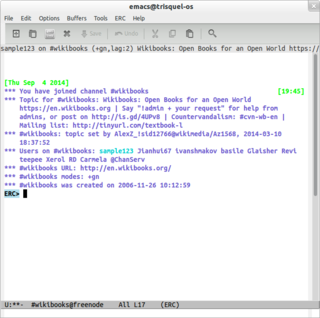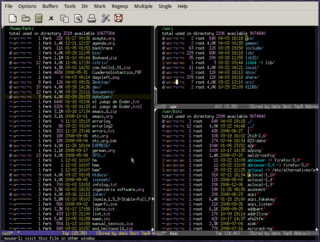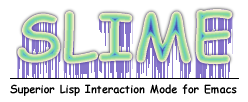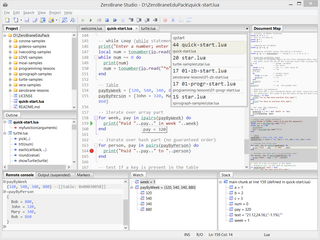The editor war is the rivalry between users of the Emacs and vi text editors. The rivalry has become a lasting part of hacker culture and the free software community.

XEmacs is a graphical- and console-based text editor which runs on almost any Unix-like operating system as well as Microsoft Windows. XEmacs is a fork, based on a version of GNU Emacs from the late 1980s. Any user can download, use, and modify XEmacs as free software available under the GNU General Public License version 2 or any later version.
DotGNU is a decommissioned part of the GNU Project that aims to provide a free software replacement for Microsoft's .NET Framework by Free Software Foundation. Other goals of the project are better support for non-Windows platforms and support for more processors.

The GNU Project is a free software, mass collaboration project that Richard Stallman announced on September 27, 1983. Its goal is to give computer users freedom and control in their use of their computers and computing devices by collaboratively developing and publishing software that gives everyone the rights to freely run the software, copy and distribute it, study it, and modify it. GNU software grants these rights in its license.
In computing, gettext is an internationalization and localization system commonly used for writing multilingual programs on Unix-like computer operating systems. One of the main benefits of gettext is that it separates programming from translating. The most commonly used implementation of gettext is GNU gettext, released by the GNU Project in 1995. The runtime library is libintl. gettext provides an option to use different strings for any number of plural forms of nouns, but it has no support for grammatical gender.

Fast Light Toolkit is a cross-platform widget library for graphical user interfaces (GUIs), developed by Bill Spitzak and others. Made to accommodate 3D graphics programming, it has an interface to OpenGL, but it is also suitable for general GUI programming.

NEdit, the Nirvana editor, is a text editor and source code editor for the X Window System. It has an interface similar to text editors on Microsoft Windows and Macintosh, rather than to older UNIX editors like Emacs. It was initially developed by Mark Edel for Fermilab and released under a very restrictive licence, but today it is distributed under the less restrictive GNU General Public License, and developed as an independent open-source project by a team of developers. Nedit was also distributed with the IRIX operating system.

ERC is an Internet Relay Chat (IRC) client integrated into GNU Emacs. It is written in Emacs Lisp.

GNU Ubiquitous Intelligent Language for Extensions is the preferred extension language system for the GNU Project and features an implementation of the programming language Scheme. Its first version was released in 1993. In addition to large parts of Scheme standards, Guile Scheme includes modularized extensions for many different programming tasks.
This article provides basic comparisons for notable text editors. More feature details for text editors are available from the Category of text editor features and from the individual products' articles. This article may not be up-to-date or necessarily all-inclusive.

Dired is a computer program for editing file system directories. It typically runs inside the Emacs text editor as a specialized mode, though standalone versions have been written. Dired was the first file manager, or visual editor of file system information. The first version of Dired was written as a stand-alone program circa 1974 by Stan Kugell at the Stanford Artificial Intelligence Laboratory (SAIL). It was incorporated into GNU Emacs from the earliest versions, and re-implemented in C and C++ on other operating systems.

SLIME, the Superior Lisp Interaction Mode for Emacs, is an Emacs mode for developing Common Lisp applications. SLIME originates in an Emacs mode called SLIM written by Eric Marsden. It is developed as an open-source public domain software project by Luke Gorrie and Helmut Eller. Over 100 Lisp developers have contributed code to SLIME since the project was started in 2003. SLIME uses a backend called Swank that is loaded into Common Lisp.

MIT/GNU Scheme is a programming language, a dialect and implementation of the language Scheme, which is a type of Lisp. It can produce native binary files for the x86 processor architecture. It supports the standard R7RS mostly. It is free and open-source software released under a GNU General Public License (GPL). It was first released by the developers at the Massachusetts Institute of Technology (MIT), in 1986, as free software even before the Free Software Foundation, GNU, and the GPL existed. It is now part of the GNU Project.
SETEDIT is an open source, multi-platform clone of the editor of Borland's Turbo* IDEs, with several improvements. According to the project page, it was started in 1996. It is not vi or emacs, but may be familiar to DOS users, as noted in reviews. It is the editor used by RHIDE.

GNU Emacs is an Emacs text editor. It was created by GNU Project founder Richard Stallman. In common with other varieties of Emacs, GNU Emacs is extensible using a Turing complete programming language. GNU Emacs has been called "the most powerful text editor available today". With proper support from the underlying system, GNU Emacs is able to display files in multiple character sets, and has been able to simultaneously display most human languages since at least 1999. Throughout its history, GNU Emacs has been a central component of the GNU project, and a flagship of the free software movement. GNU Emacs is sometimes abbreviated as GNUMACS, especially to differentiate it from other EMACS variants. The tag line for GNU Emacs is "the extensible self-documenting text editor".

Emacs or EMACS is a family of text editors that are characterized by their extensibility. The manual for the most widely used variant, GNU Emacs, describes it as "the extensible, customizable, self-documenting, real-time display editor". Development of the first Emacs began in the mid-1970s, and work on its direct descendant, GNU Emacs, continues actively as of 2020.

Org-mode is a document editing, formatting, and organizing mode, designed for notes, planning, and authoring within the free software text editor Emacs. The name is used to encompass plain text files that include simple marks to indicate levels of a hierarchy, and an editor with functions that can read the markup and manipulate hierarchy elements.

ZeroBrane Studio is a lightweight open-source Lua IDE with code completion, syntax highlighting, code analyzer, live coding, and debugging support for Lua 5.1, Lua 5.2, Lua 5.3, LuaJIT, and other Lua engines. ZeroBrane Studio is a cross-platform application written in Lua that runs on Windows, Linux, and macOS (10.9+) operating systems. It uses the wxWidgets toolkit and the Scintilla component for file editing.












